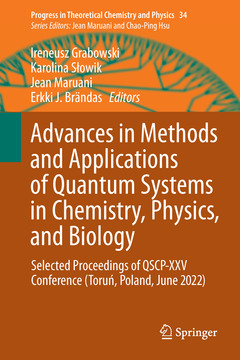Description
Advances in Methods and Applications of Quantum Systems in Chemistry, Physics, and Biology, 1st ed. 2024
Selected Proceedings of QSCP-XXV Conference (Toruń, Poland, June 2022)
Progress in Theoretical Chemistry and Physics Series, Vol. 34
Coordinators: Grabowski Ireneusz, Słowik Karolina, Maruani Jean, Brändas Erkki J.
Language: English
Subject for Advances in Methods and Applications of Quantum Systems...:
286 p. · 15.5x23.5 cm · Hardback
Description
/li>Contents
/li>Biography
/li>Comment
/li>
This book contains peer-reviewed contributions based on talks presented at the 25th International Workshop on Quantum Systems in Chemistry, Physics, and Biology held in Toru?, Poland, in June 2022. The book reviews significant advances in concepts, methods, and applications of quantum systems in a broad variety of areas in modern chemistry, physics, and biology. In particular, it discusses atomic, molecular, and solid state structure, dynamics and spectroscopy, relativistic and correlation effects in quantum chemistry, topics of computational chemistry, physics, and biology, as well as applications of theoretical chemistry and physics in advanced molecular and nano-materials and biochemical systems. This book is aimed at advanced graduate students, academics, and researchers, both in university and corporation laboratories, interested in state of the art and novel trends in quantum chemistry, physics, and biology, and their applications.
Karolina Słowik is an associate professor at the Institute of Physics, Nicolaus Copernicus University in Toruń, Poland, where she obtained her PhD in physical sciences in 2012. She spent her postdoctoral years in Germany at the Friedrich Schiller University in Jena and the Karlsruhe Institute of Technology, which both are excellent centers for photonics. Her background covers the quantum theory of light-matter interactions in various aspects, from quantum nanophotonics to optically dressed atomic media to optical properties of low-dimensional structures and materials.
Jean




